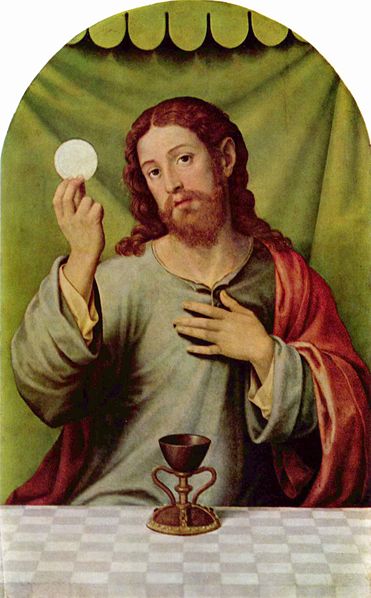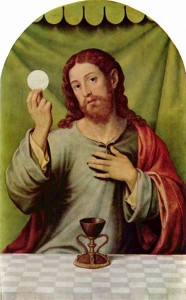CORPUS CHRIST: THE MOST HOLY
BODY AND BLOOD OF THE LORD
Corpus Christi is one of the greatest solemnities in the Christian calendar. Let us meditate briefly the meaning of this popular feast. We begin with the message from the Word of God.
- LITURGY OF THE WORD
First Reading: Dt 8:2-3, 14-16. “God fed you with manna…†He fed his people also with his words: “He fed you with manna in order to show you that not by bread alone does one live, but by every word that comes forth from the mouth of the Lord.â€
Second Reading: I Cor 10:16-17. Christ continues feeding us with his Body and Blood – with himself! Communion with the Lord is communion with the brothers and sisters for we all partake of one bread: “we, though many, are one body, for we all partake of the one loaf.â€
The Holy Gospel: Jn 6:51-58. This section is part of the difficult and challenging discourse of Jesus on the Bread of Life. To take part in the Eucharistic celebration means to enter into a close intimate relation with Christ here and hereafter: “I am the living breadâ€; “My flesh is true food and my blood is true drinkâ€; “Whoever eats my flesh and drinks my blood has eternal life.â€
What is the meaning of Corpus Christi for us?
2. MEDITATION
At first (and up to the 13th century), there was no particular feast for the Bread of Life; this was part of Holy Thursday. The Feast of Corpus Christi was instituted by Pope Urban IV in the year 1264. The Pope asked St. Thomas Aquinas to write the divine office of the Corpus Christi. The Angelic Doctor – master and mystic – wrote it, including the lovely hymns O Sacrum Convivium, Pange Lingua, Adoro te devote, Panis Angelicus, etc. The objective of the new feast was: To proclaim faith in the real presence of Christ in the Eucharist, in the Blessed Sacrament. We Christians believe that the Eucharist is the sacrament of sacraments (St. Thomas Aquinas), “the greatest gift of the Sacred Heart of Jesus†(Pope Paul VI), “the source and apex of the whole Christian life†(Vatican II, LG, 11). The Eucharist is
What is the Eucharist for us Christians?
Many wonderful things!
- The real presence of Christ: “This is my Body…†“This is the cup of my Blood.â€
- The sacrament and the sacrifice of Christ on the cross: source of grace and graces for our journey. “Do this in memory of me.â€
- The memorial of the death and resurrection of Christ. “Do this in memory of me.â€
- Pledge of heaven: “He who eats this Bread will live forever.â€
- The perfect prayer – of thanksgiving, petition, reparation and adoration.
How may we respond to Corpus Christi today?
3. RESPONSE
On this great feast, we Christians strengthen our faith in the Eucharist as a central mystery of our life. Christ is really present in the Eucharist! We adore him in the Blessed Sacrament. We visit him present in so many churches and chapels. At the beginning of this millennium, Blessed Pope John Paul II beatified Bishop Manuel Gonzalez, a servant of God totally dedicated to promote the devotion of the Blessed Sacrament, particularly with his visits to “Sagrarios abandonados†– “abandoned Tabernacles.â€
We receive Christ in the Eucharist. If properly disposed, we approach the Table of the Eucharist of the Mass; earlier we approached the Table of the Word. With Christ as our Eucharistic Bread, we receive the brothers and sisters of Christ. The Eucharist is a communion – and a call to unity (cf. I Cor 10:16-17). The Eucharist is “one Bread that helps us behave as one Body, as one People.â€
Blessed John Paul II wrote: “Thus the Lord unites us with himself through the Eucharist – Sacrament and Sacrifice – and he unites us with himself and with one another by a bond stronger than any natural union; and thus united, he sends us into the whole world to bear witness, through faith and works, to God’s love†(SRS 48).
In this glorious and colorful solemnity of Corpus Christi, we Christians are asked by Jesus our Lord and Savior to break bread and share the Bread of Life – our life – with others, particularly with those who have no bread. Indeed, man does not live by bread alone, but he cannot live without bread! In the evening of life, we all shall be examined on love, above all, on love of the poor! Jesus will ask you zand me then: I was hungry, did you give me bread, or manna, or rice? (See Mt 25:31:46).
Corpus Christi is indeed a most significant feast for all Christians. No wonder that Sunday was so essential in the life of the Christians of the first centuries! They all went to Mass – for “the breaking of the Bread†-, even if it was forbidden to them by “pagan†governments. When Christians were caught celebrating the Mass by the civil authorities, they were sent to jail. The judge asked them: “Why do you celebrate underground your rituals on Sunday, when you know that, if caught, you will end up in jail? The Christians answered as one: “We are Christians, and it is impossible for us to live without the Eucharistâ€; “Without Sunday, we cannot live.â€
May we live without the Sunday Eucharist?
May Mary, the Mother of Jesus and our Mother lead us to a fuller understanding of the Eucharist and consequent commitment to sharing Word and bread with others!
Let us close with the beautiful prayer O Sacrum Convivium:
“O Sacred Banquet, in which Christ is received, the memory of his passion is recalled, the soul is filled with grace and a pledge of future glory is given us. Amen.â€
FAUSTO GOMEZ, O.P.
St. Dominic’s Priory
Macau, June 26, 2011


